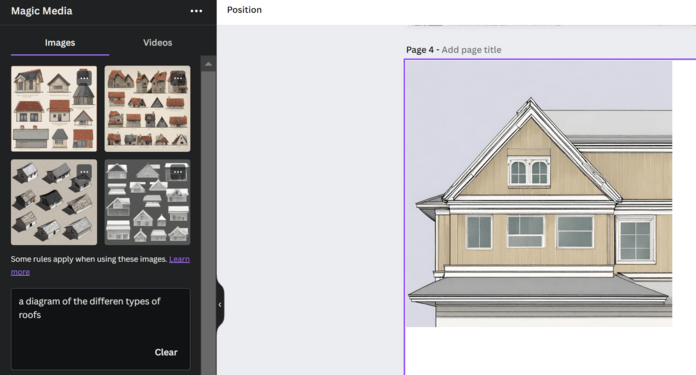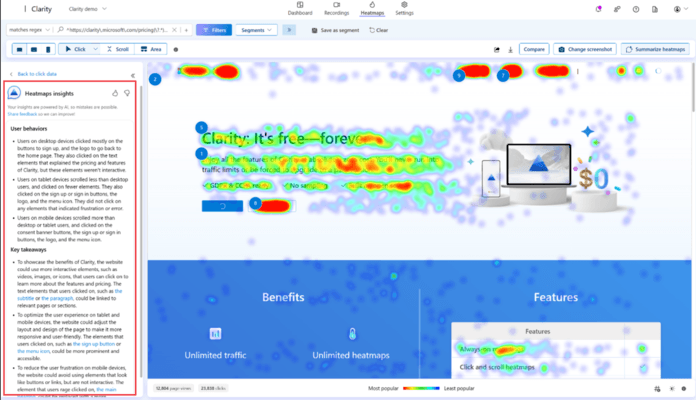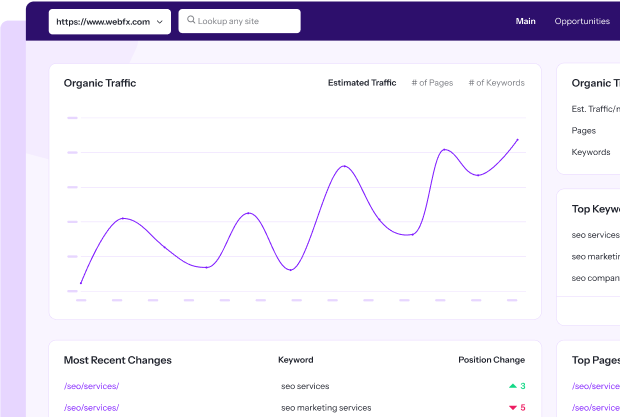With AI for search engine optimization (SEO), it’s possible to build a streamlined SEO program that maximizes your time and the capabilities of AI SEO tools like ChatGPT, Jasper, and Surfer. Learn how to use AI for SEO now with our team’s favorite use cases!
How to use AI for SEO
When it comes to how to use AI for SEO, there are multiple applications, including:
1. Competitor research
Understand the competition better with AI-powered insights into:
- Rankings
- Content hubs
- Tone
Plus, get instant summaries of a competitor’s strengths and weaknesses. You can also do competitor research on a page-by-page basis. For example, instantly analyze the top-ranking pages for a specific search result with AI to find opportunities for your content.
2. Keyword research
Discover relevant short- and long-tail keywords with artificial intelligence. Customize keyword research prompts to focus on surfacing keyword ideas related to your target audience — like first-time parents vs. first-time grandparents — to get even better suggestions.
3. SEO content outlines
One of the most common AI SEO use cases is building content outlines. These outlines can serve as a brief for copywriters, providing valuable information about the target audience, content structure, and search intent.
Like all AI use cases, reviewing the AI’s output is essential. Mistakes in content outlines could result in rewrites, creating hours of work for you and your team. Publishing this content could also risk a less-than-stellar response from readers (and Google).
4. Meta tag ideas
When it comes to AI SEO optimizations, artificial intelligence is fantastic for generating ideas for:
- Title tags
- Meta descriptions
- Headings
Ahrefs and Semrush both offer a free tool for generating title tags. However, creating custom prompts for title tag (or meta tag) ideas is possible. With TeamAI, you can even share these reusable prompts with your team.
5. Image creation
While screenshots offer helpful guidance, custom graphics also provide value, giving users another option for consuming content. Plus, these graphics can stand out in Google Image and AI Overview results, providing another avenue for organic traffic.

Create custom images using AI tools like ChatGPT Plus, Canva, or Gemini.
6. Image alt text
AI can do more than create images for SEO — it can also write their alt text with tools like:
While ChatGPT Plus requires a subscription, Gemini and Ahrefs are free. While Ahrefs provides a prompt, Gemini and ChatGPT require creating one. Again, TeamAI can help here by storing, sharing, and using reusable prompts.
7. Schema markup generation
Schema markup is a powerful SEO and generative engine optimization (GEO) tactic, but generating structured data can take time. With AI models like ChatGPT, it’s possible to have AI generate schema markup like FAQ and HowTo — and even implement it, depending on your web development skills.
8. Internal linking ideas
Find internal linking opportunities faster with AI-powered SEO. With an effective prompt and the right data connections, finding relevant URLs to link to one another is possible, which can improve website crawling and the user experience.
9. Data analysis
Get instant insight into thousands of data points with an AI model like ChatGPT or Claude. With these tools, it’s possible to upload data, like rankings over time and ongoing optimizations, to uncover and understand trends.
10. Project specs
Help team members, from developers to content writers, better understand the purpose of SEO projects with AI models like Gemini, ChatGPT, or Claude. These models can create effective templates and offer suggestions on making these specs easier to understand for non-SEOs.
11. Page experience analysis
Page experience is a critical part of search engine optimization, and with AI for SEO, it’s possible to leverage artificial intelligence here. With a free tool like Microsoft Clarity, for example, you can access AI-generated insights into user behavior via heatmaps, click maps, and more.

Get started with AI SEO optimizations
You’ve learned how to use AI for SEO. Now, bring these AI SEO optimizations to your SEO program! Check out our AI search optimization services if you want professional assistance and access to a team of AI SEO specialists to help improve your search engine optimization performance!
FAQs about AI SEO
Learn more about AI SEO with these FAQs:
What is AI SEO?
AI SEO is the use of artificial intelligence in search engine optimization. AI SEO uses third-party tools, like ChatGPT or Ahrefs, to deliver AI-powered SEO optimizations for keyword research, schema markup, and other use cases.
Why is using AI for SEO important?
AI for SEO is important because it can enhance existing SEO efforts while optimizing the practitioner’s time. For example, using AI to generate schema markup for a URL saves time while improving the URL’s search engine optimization.
Does AI content work for SEO?
It depends. Content entirely created and written by AI can sometimes go against Google’s guidelines and could be considered spam. However, using AI for content topic ideas and generating outlines is a great way to optimize your SEO content marketing strategy.
How can I use AI for SEO?
You can use AI for SEO in multiple ways, including the following:
- Summarizing competitor performance
- Starting keyword research
- Drafting content outlines
- Generating meta tag ideas, like for title tags and meta descriptions
- Creating schema markup for a URL
- Analyzing SEO data
- And more
While some AI SEO tools provide pre-built prompts for the above applications, creating your own is possible. While creating prompts takes some time and experience, their reusability makes them invaluable.
When should I use AI for SEO?
Consider using AI for SEO when the following is true:
- The output is accurate
- The output is helpful
- The output is time-saving
While the above can apply to AI-generated content (which Google does not penalize), we recommend not creating AI content. Instead, use AI to inform content and help copywriters produce helpful, authoritative, and trustworthy content.
What are some AI SEO tools to use?
There are several AI SEO tools available, including the following:
- ChatGPT
- Jasper
- Surfer
- Ahrefs
For beginners, we recommend using ChatGPT, which offers a free plan for exploring AI SEO.
Cut Your SEO Time in Half


$3bn+
revenue driven for clients



Add WebFX to your content marketing toolbox today
Get SEO ProposalTable of Contents
- How to Use AI for SEO
- 1. Competitor Research
- 2. Keyword Research
- 3. SEO Content Outlines
- 4. Meta Tag Ideas
- 5. Image Creation
- 6. Image Alt Text
- 7. Schema Markup Generation
- 8. Internal Linking Ideas
- 9. Data Analysis
- 10. Project Specs
- 11. Page Experience Analysis
- Get Started with AI SEO Optimizations
- FAQs About AI SEO
$3bn+
revenue driven for clients



Add WebFX to your content marketing toolbox today
Get SEO Proposal


